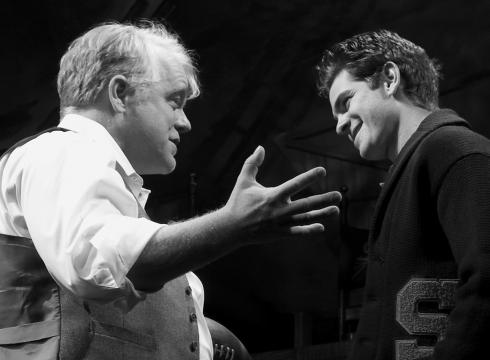Review: Death of a Salesman
 |
| Phillip Seymour Hoffman and Andrew Garfield in Death of a Salesman |
On rare occasions, a piece of theatre will leave you so
profoundly affected that finding words to describe what you feel proves
difficult. The writing, direction, and performances
all combine and send you into a momentary stupor as your brain attempts to
process the depth of what you’ve just experienced. You remain in your seat after the lights come
up, hoping that by lingering in the theatre you’ll be able to enjoy its transcendent
nature just a while longer. The knockout
revival of Arthur Miller’s Death of a
Salesman is such a piece of theatre.
Miller’s script is such an acknowledged masterpiece that
it’s easy to forget just how incredible his writing truly is. This portrait of aging salesman Willy Loman uses
incredibly specific characterizations to reveal something universal about the
human experience, and it’s themes of shattering disappointment and unfulfilled
potential remain timely over sixty years after its premiere. Seeing a man who has poured his entire life
into a company unceremoniously dismissed strikes an especially potent chord in
our post-recession economy. And in a
society where adolescence has stretched into a person’s mid-twenties and
beyond, Miller’s parallel tale of the arrested development of Willy’s two sons is
instantly recognizable.
But a play, even a great one, does not perform itself. And for this latest Broadway revival,
director Mike Nichols has assembled a cast equal to the monumental potential of
Miller’s script. Oscar-winner Phillip
Seymour Hoffman anchors this production with a tower performance in one of the
theatre’s great roles, embodying Willy’s crushed soul from his first shambling
footsteps onto the Barrymore Theatre’s stage.
Although considerably younger his character, Hoffman so convincingly
portrays a man suffering from a lifetime of disappointment that you accept him
as Willy immediately. And while his
desperation can be uncomfortably oppressive (as it should be), Hoffman peels
back those years during the play’s flashback sequences to offer a glimpse of the
great man everyone claims Willy used to be.
Hoffman’s contribution to the success of this production cannot be
ignored, and anyone interested in seeing a true master at work owes it to themself
to see him in this role.
Hoffman is more than ably supported by his costars,
particularly Linda Emond. As Willy’s
long-suffering wife Linda, Emond takes a character type that has become cliché
and invests it with such conviction that it seems new again. While you completely understand and
sympathize with Linda, you cannot pity her because Emond makes it clear she
doesn’t want to be pitied. Of the
characters in the play, Linda is the most at peace with the family’s current
situation, which only makes her final monologue all the more
heartbreaking. The play would lead you
to believe that Linda has little left to lose, and yet by the end you know that
she had everything to lose, and now that it is gone she is will likely never
recover.
And then there is Andrew Garfield, a promising young film
talent making a phenomenal Broadway debut as Willy’s son Biff. Garfield is also too young for his role, but just
like Hoffman he makes you forget that fact in seconds. Biff’s tragedy is that he knows exactly
what’s wrong with him and yet is powerless to change, and Garfield communicates
that conflict flawlessly. Resentful of
the expectations placed on him by his father and filled with guilt over his
inability of meet them, Garfield’s Biff is a cornered animal, dangerous and
likely to lash out at any moment. His
scenes with Hoffman are simply electric.
Mike Nichols has guided his cast to perfectly pitched
performances, ensuring the play moves inexorably towards its final
conclusion. So expertly paced is the
piece that although it never drags, it never feels rushed either, with each
revelation being afforded the proper dramatic weight. The sublimely understated sets, costumes, and
lighting keep the focus squarely on the human drama at the play’s center,
allowing Nichols and his actors to do their work unimpeded.
This revival of Death
of a Salesman is an affirmation of the incredible power live theatre can
wield, and is an event that only comes around once in a great long while. A great production of a great play, it simply
cannot be missed.
No comments:
Post a Comment